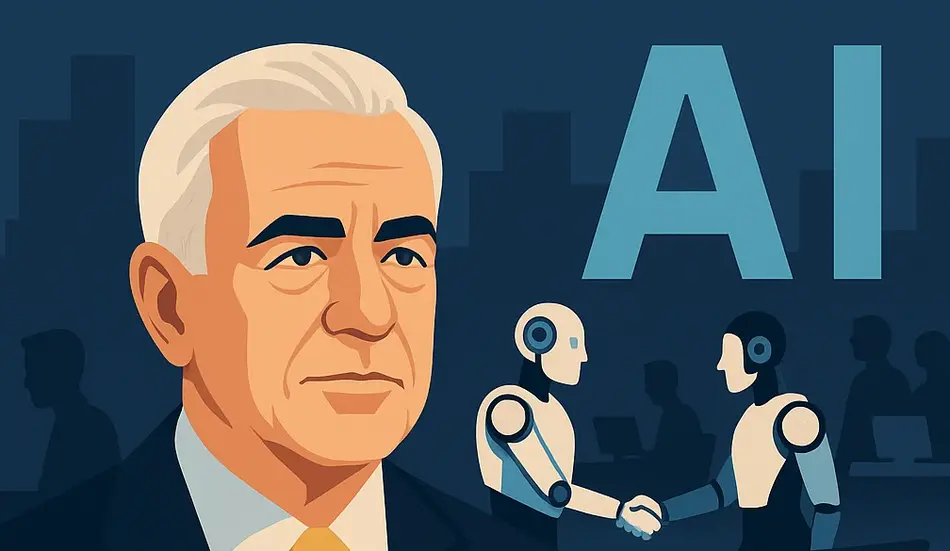JPMorgan’s Jamie Dimon says AI is going to eliminate some jobs while simultaneously creating new opportunities and transforming every aspect of banking operations. The CEO’s candid assessment reflects the reality that artificial intelligence will fundamentally reshape the workforce, requiring proactive adaptation rather than resistance. With JPMorgan investing $2 billion annually in AI technologies and employing 2,000 dedicated AI professionals, the bank serves as a case study for how major corporations are navigating the AI revolution.
Dimon’s perspective offers valuable insights into the practical implementation of AI at scale, demonstrating that successful AI adoption requires significant investment, cultural change, and strategic workforce planning. The bank’s approach of retraining and redeploying employees rather than simply eliminating positions provides a model for other organizations facing similar technological disruption.
The transformation extends across all business functions, from risk management and fraud detection to marketing and customer service, with the bank’s internal LLM suite being used by 150,000 employees weekly. This widespread adoption illustrates how AI can enhance productivity while fundamentally changing job requirements and creating new skill demands.
JPMorgan’s AI Investment Strategy: A Decade of Development
A comprehensive strategy that began in 2012, well before the current generative AI boom, has positioned the bank as a leader in financial services technology. The bank’s early investment in artificial intelligence has positioned it as a leader in financial services technology, with a dedicated team of 2,000 AI professionals and annual spending of $2 billion.
The bank’s approach demonstrates that successful AI implementation requires long-term commitment and substantial resources. Unlike companies that view AI as a recent trend, JPMorgan has been building AI capabilities for over a decade, allowing it to develop deep expertise and establish robust governance frameworks for AI deployment.
This long-term perspective has enabled the bank to move beyond experimental AI applications to full-scale deployment across all business functions. The comprehensive nature of JPMorgan’s AI strategy means that virtually every employee will interact with AI systems in some capacity, fundamentally changing how work is performed across the organization.
The $2 Billion Investment: Measuring AI’s Business Impact
A $2 billion annual investment generates equivalent benefits, delivering measurable business value through strategic AI implementation across all operations. The bank’s ability to quantify AI’s impact demonstrates the practical value of artificial intelligence when properly implemented and integrated into business operations.
The investment has yielded tangible results including headcount reduction, time savings, error reduction, and improved service quality. While some benefits are easily measurable through specific metrics like cost savings and efficiency gains, others represent qualitative improvements in service delivery that are harder to quantify but equally valuable.
The bank’s approach to measuring AI impact provides a framework for other organizations seeking to justify AI investments. By focusing on both quantifiable benefits and qualitative improvements, JPMorgan demonstrates that AI’s value extends beyond simple cost reduction to encompass enhanced capabilities and improved customer experiences.
Internal AI Tools: Empowering 150,000 Employees
Internal AI tools enhance productivity and decision-making capabilities for 150,000 employees who use the bank’s LLM suite weekly for research and analysis. The bank’s LLM suite, built on internal data, serves 150,000 employees weekly for research, report summarization, contract analysis, and other knowledge-intensive tasks.
This widespread adoption of AI tools within the organization illustrates how artificial intelligence can augment human capabilities rather than simply replacing them. Employees are using AI to perform their existing jobs more effectively, while also developing new skills and capabilities that position them for future opportunities.
The internal AI platform represents a significant competitive advantage, allowing JPMorgan to leverage its proprietary data and domain expertise to create AI tools specifically tailored to banking operations. This approach ensures that AI implementations are relevant to actual business needs rather than generic solutions.
Workforce Transformation: Retraining and Redeployment Strategies
The bank’s commitment to retraining and redeploying employees rather than simply reducing headcount reflects a strategic approach to workforce transformation. This approach reflects a recognition that successful AI implementation requires human expertise and adaptation rather than wholesale job elimination.
The bank’s strategy of investing in employee development and career transition programs demonstrates how organizations can navigate technological disruption while maintaining workforce stability. By proactively preparing employees for changing job requirements, JPMorgan aims to retain valuable talent while adapting to new technological realities.
This approach requires significant investment in training programs and career development, but it positions the organization to benefit from both technological advancement and human expertise. The combination of AI capabilities and skilled human operators creates a more powerful workforce than either could achieve independently.
Risk Management and Compliance: AI’s Critical Role
AI performs tasks more accurately and efficiently in risk management and compliance functions, enhancing the bank’s ability to detect fraud and manage regulatory requirements. The bank’s extensive use of AI for fraud detection, risk assessment, and regulatory compliance demonstrates how artificial intelligence can enhance these critical functions.
AI’s ability to process vast amounts of data and identify patterns that might escape human analysis makes it particularly valuable for risk management. The technology can monitor transactions in real-time, detect anomalies, and flag potential issues before they become significant problems.
The bank’s emphasis on safe AI deployment with appropriate rules and regulations reflects the critical importance of maintaining security and compliance in financial services. This careful approach ensures that AI enhances rather than compromises the bank’s risk management capabilities.
Customer Service Evolution: AI-Enhanced Interactions
Traditional customer service roles are evolving to create new opportunities for AI-enhanced interactions that combine efficiency with personalized service. The bank’s use of AI for customer service demonstrates how technology can improve service quality while changing the nature of customer-facing roles.
AI-powered customer service tools can provide faster, more accurate responses to customer inquiries while freeing human agents to handle more complex issues that require personal attention. This hybrid approach combines the efficiency of AI with the empathy and problem-solving capabilities of human agents.
The evolution of customer service roles reflects a broader trend toward more specialized, value-added positions that leverage both human skills and AI capabilities. Employees who can effectively work with AI tools to enhance customer experiences will be more valuable than those who resist technological change.
Marketing and Idea Generation: AI as a Creative Partner
Marketing and idea generation roles are transforming to create new opportunities for AI-enhanced creativity and strategic thinking that augment human capabilities. The bank’s use of AI for marketing optimization and idea generation demonstrates how artificial intelligence can augment human creativity rather than replace it.
AI tools can analyze market data, customer behavior, and competitive intelligence to generate insights that inform marketing strategies and product development. This capability allows marketing professionals to focus on high-level strategy and creative execution rather than data analysis and research.
The integration of AI into creative processes requires a shift in how marketing professionals approach their work, emphasizing collaboration with AI tools rather than competition. This collaborative approach can lead to more innovative solutions and better outcomes than either humans or AI could achieve independently.
The Future of Banking Jobs: Adaptation and Growth
New opportunities emerge for those willing to adapt and develop new skills, creating a pathway for career growth in an AI-enhanced banking environment. The bank’s projection that successful AI implementation will result in net job growth reflects an optimistic view of technology’s potential to create new opportunities.
The key to success in an AI-driven banking environment is proactive adaptation rather than resistance to change. Employees who embrace AI tools and develop complementary skills will be better positioned for career advancement and job security.
The bank’s commitment to retraining and redeployment programs provides a pathway for employees to transition into new roles that leverage both human expertise and AI capabilities. This approach ensures that technological advancement benefits both the organization and its workforce.
The Future of Banking Careers
AI is transforming banking — but with change comes opportunity. Employers can lead the shift by hiring professionals eager to adapt, retrain, and grow in AI-enhanced financial services. Post your job on WhatJobs today and connect with talent ready to drive innovation while building secure, future-proof careers in banking.
Post a Job Free for 30 Days →Industry Implications: A Model for Financial Services
JPMorgan’s approach serves as a model for other institutions across the financial services industry, demonstrating how to navigate technological disruption successfully. The bank’s comprehensive AI strategy and workforce development programs provide a template for how other organizations can navigate technological disruption.
The financial services industry’s heavy reliance on data analysis, risk assessment, and customer service makes it particularly susceptible to AI transformation. Organizations that follow JPMorgan’s lead in investing in AI capabilities and workforce development will be better positioned to compete in an increasingly technology-driven market.
The bank’s success in implementing AI while maintaining workforce stability demonstrates that technological advancement and human employment can coexist when properly managed. This approach offers hope for other industries facing similar technological disruption.
Frequently Asked Questions
What does JPMorgan’s Jamie Dimon says AI is going to eliminate some jobs mean for banking careers?
JPMorgan’s Jamie Dimon says AI is going to eliminate some jobs means that certain traditional banking roles will be automated, but new opportunities will emerge for employees who adapt and develop AI-complementary skills through retraining and redeployment programs.
How does JPMorgan’s Jamie Dimon says AI is going to eliminate some jobs compare to other industries?
JPMorgan’s Jamie Dimon says AI is going to eliminate some jobs reflects a broader trend across industries where AI automates routine tasks while creating new opportunities for human-AI collaboration, with the banking sector being particularly affected due to its data-intensive nature.
What are the key strategies behind JPMorgan’s Jamie Dimon says AI is going to eliminate some jobs approach?
Key strategies include $2 billion annual AI investment, 2,000 dedicated AI professionals, comprehensive retraining programs, internal AI tools for 150,000 employees, and a focus on human-AI collaboration rather than simple job replacement.
How can banking professionals prepare for JPMorgan’s Jamie Dimon says AI is going to eliminate some jobs reality?
Banking professionals can prepare by embracing AI tools, developing complementary skills, participating in retraining programs, focusing on areas where human expertise adds value, and staying updated on technological developments in their field.
A Real-World Example: Maria’s Career Transformation
Maria Santos, a 28-year-old risk analyst at JPMorgan, exemplifies how JPMorgan’s Jamie Dimon says AI is going to eliminate some jobs can actually create new opportunities for those willing to adapt. When the bank began implementing AI tools for risk assessment, Maria initially worried about job security but decided to embrace the technology rather than resist it.
“I was concerned when I heard that JPMorgan’s Jamie Dimon says AI is going to eliminate some jobs, especially in risk management where I worked,” Maria explains. “But instead of being afraid, I asked my manager about training opportunities and how I could work with the new AI systems.”
Maria’s proactive approach led to her being selected for the bank’s AI training program, where she learned to work alongside AI tools to enhance risk analysis capabilities. She discovered that the AI could process vast amounts of data quickly, but her human expertise was still essential for interpreting results and making complex decisions.
“JPMorgan’s Jamie Dimon says AI is going to eliminate some jobs taught me that the key is adaptation, not resistance,” Maria says. “The AI tools made me more effective at my job, and I was able to take on more complex projects that required both AI capabilities and human judgment.”
Within two years, Maria was promoted to a senior risk analyst role that focused on AI-human collaboration, earning a 30% salary increase and gaining expertise that made her highly valuable in the evolving banking landscape. Her experience demonstrates that JPMorgan’s Jamie Dimon says AI is going to eliminate some jobs doesn’t mean the end of banking careers, but rather the beginning of a new era of human-AI collaboration.




